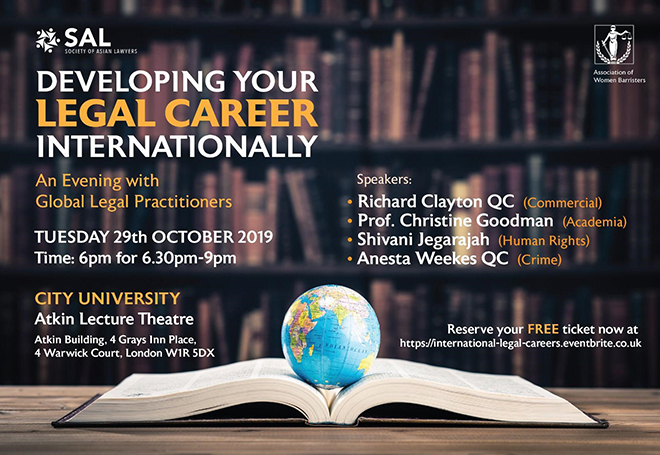Developing Your Legal Career Internationally
29th October 2019
Joint Event: Society of Asian Lawyer with Association of Women Barristers
This was a successful co-sponsored event with a rich and diverse panel who spoke candidly, about the challenges of developing an international legal practice. It certainly gave me some ideas of how to engage with international academic institutions and the importance of keeping things simple and taking immediate action.
The highlights
Professor Christine Goodman, an academic from Pepperdine University, with a specialism Comparative Anti-Discrimination Law. Christine has participated in Pepperdine’s Global Justice Program in Uganda and India and taught in the London Program.
Christine focused on Need, Niche and Network, encouraging the audience to identify the international law needs (for example in social justice, human rights or on the environment) and to develop your skills and interest in a niche area of law about which you are truly passionate and thereafter network within that area of law.
Usefully, Christine clarified the difference between a Mentor, a Coach and a Sponsor and how to identify which one and who in particular is the right fit for your goals. A mentor offers guidance, whereas a coach wants you to win and will push you hard to achieve your goals and a sponsor is someone will put you and your background in front of the right people to progress your career. Those particularly interested in gender equality were encouraged to make direct contact with Christine.
Shivani Jegarajah was called to the bar in 1993 and co-founded an all women set namely, Justitia Chambers, with the aim of encouraging careers of working parents and carers. Shivani is regularly instructed on criminal deportation cases and immigration matters. She has made representations to the United Nations Human Rights Council.
Shivani recommended contacting one of the hundreds of NGOs that attend UNHRC meetings. There are big organisations such as Liberty or Amnesty International but you can look at the smaller organisations as well. Offer to be their advocate and then get them to sponsor your trip. They are your platform for addressing the Human Rights Council. It does not matter what age you are, if you are passionate and enthusiastic about the subject matter, demonstrate that passion and ask the question from the NGO. Shivani spoke about having freedom from fear; the only thing stopping you developing an international legal career is you.
Balance your time networking and actually doing your job, Shivani explained how networking can initially be done online without time away from your desk. Eventually you will have to go out and meet people but first get connected and brush up on your specialism. Shivani is open to mentoring.
Richard Clayton QC is a deputy high court judge and commercial arbitrator at Ely Place Chambers who undertakes a broad range of advisory and litigation work, in public and constitutional law. Richard is currently running a procurement argument in Trinidad and an arbitration in the Middle East. He is co-author of The Law of Human Rights published by the Oxford University Press, which is regularly cited in the Privy Council, House of Lords and Supreme Court.
Richard emphasised the difficulty of building relationships from a cold start and garnering respect but also about the need to be ready and available to take on weird and unusual cases pro-bono to build your reputation and to consider qualifying in foreign jurisdictions depending on the strength of your UK practice, balancing the need to cultivate what you have here with the opportunity to reach a broader pool of clients.
Anesta Weekes QC is a distinguished silk at 33 Bedford Row regularly undertaking Privy Council work dealing with both civil and criminal appeals originating in Bermuda, Bahamas, Monstserrat and Antigua. Anesta was appointed as a Record in 1999. Anesta first undertook international cases following instructions from the Foreign and Commonwealth Office.
Anesta’s starting point is to look at the areas of law that involve international work, for example maritime law, family law (abduction cases) or anything to do with the exchange of money, even the rubbish in your dustbin has to be dumped as waste somewhere in the world. Ask yourself what you are good at and in what are you interested. She recommended reading the leading case on your interested area of law and writing an article about your specialism, getting it published and becoming a specialist on this subject.
A human rights and international team has evolved at her set of chambers simply because several people in chambers have undertaken this type of work.
In terms of help that is offered within the international sphere: 33 Bedford Row Chambers has an unfunded international pupillage for foreign students looking to train in the UK but practice abroad. We encourage the foreign students who attended to look at this to see if they qualify. Anesta is also a great champion for undertaking pro-bono instructions early on in your career in international cases and looking at your own foreign heritage and qualifying in another jurisdiction early on in your career. Anesta mentors several junior barristers and explained the challenge of finding the right mentor. Younger practitioners should bear in mind that lawyers are not trained mentors, but there will be someone out there who can guide you.
The Society of Asian Lawyers and the Association of Women Barristers both offer mentoring schemes. Please enquire using our online form.
By Chamali Fernando
Chamali is a barrister in England and Wales, practising at Peregrine Law (a boutique international corporate firm) and is also a licensed attorney in New York, USA. Chamali serves on the SAL committee.

